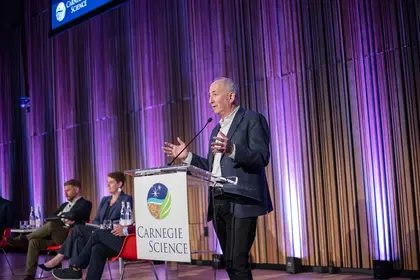
Nuclear power technology has advanced to include novel approaches that go beyond the traditional light water reactors. These fourth-generation reactors represent faster, safer, and more compact and efficient small reactors and microreactors, and cooling functions are often performed by other materials including sodium, lead, fluoride salt, and helium gas.
On September 14, Carnegie assembled a panel of four experts from government, industry, and the non-profit sector to discuss the role of advanced nuclear technology in mitigating carbon pollution and fighting climate change.
Led by moderator Greg Gershuny, executive director of the Aspen Institute Energy and Environment Program and co-director of Aspen Ideas: Climate, the panel featured Kathryn Huff, assistant secretary of the Energy Department’s Office of Nuclear Energy, Josh Freed, senior vice president of the climate and energy program at public policy think tank Third Way, and Jeff Navin, director of external affairs at advanced nuclear reactor company TerraPower.
Gershuny kicked off the program by asking audience members to participate in a cell phone poll identifying themselves as Dr. Oppenheimers (32.3 percent), Homer Simpsons (41.5 percent), or Dora the Explorers (26.2 percent) when it comes to their knowledge of nuclear physics and energy. This is an excellent representation of the broad swath of science enthusiasts who attend Carnegie’s Capital Science Evenings public lecture series, which has been bringing quality science programming to the DC area since the 1990s.
The group’s wide-ranging discussion included nuclear energy’s role in decarbonization efforts, incentives for private industry participation, storage of spent nuclear fuel, and job creation by the advanced nuclear sector.
“The last couple of years have been incredible in putting resources into the hands of the Department of Energy, our counterparts across the various climate-related agencies, and in the hands of, potentially, industry,” Huff said. “Ideally, the United States federal government’s budget should not be the sole investor in this expansion. Actually, it should incentivize much more private money.”
The panel addressed interesting challenges, including how the nuclear sector can contribute to overcoming energy storage issues caused by variability in renewable energy resources like solar and wind to ensure sufficient power is available during high-usage times of day. Overall, they agreed that nuclear energy has a critical role to play in minimizing carbon pollution.
Freed related the story of a nuclear plant in Michigan that is the first ever to start decommissioning and then come back online due to increased profitability made possible by recent government policies on decarbonization “That is an incredible turn of events that keeps more clean energy online, but also provides a really important signal for anyone on the utility scale to consider: What do we build next; why do we build it?”

Addressing questions from the audience, experts also weighed in on the need for domestic enrichment programs for maintaining energy security.
“The administration has taken significant steps to restore America’s production of civilian sources for HALEU (High-Assay, Low-Enriched Uranium) so that reactor plants can use that fuel domestically sourced,” said Navin.
In drawing the conversation to a close, Carnegie President Eric Isaacs noted that the breadth of discussion topics and the variety of perspectives represented on the panel illustrate how far the nuclear power conversation has come in recent years.
“If we had convened this panel 10 or 15 years ago it would have been a very different discussion,” said Isaacs. “For me, tonight was a very enjoyable night. I want to thank you. I’m very, very encouraged.”
The collaborative spirit expressed in the room is sure to drive advancements that will benefit us all as we strive to address climate change, Isaacs added.
